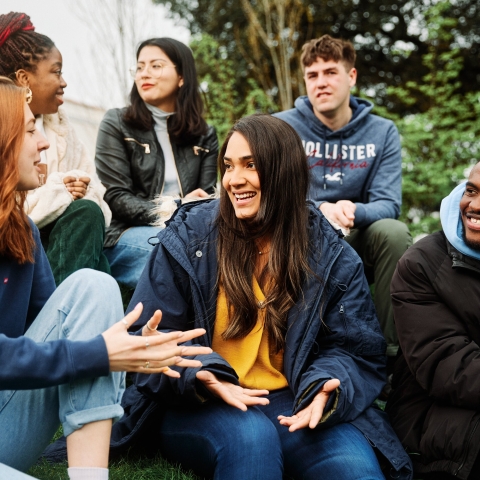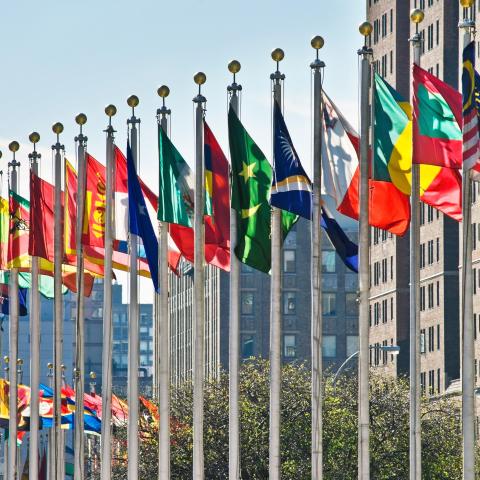
Volunteering abroad can give you experience and skills that can be hard to get elsewhere, improve your CV and help you decide what you might like to do in the future. It can also be an incredible experience that will always stay with you.
When you volunteer internationally, you'll have new experiences, develop employability skills to help you stand out in the graduate job market, improve your language skills, get an introduction into the charity sector and meet new people.
Choosing a project
There are important considerations to be made when selecting the cause, project and organisation to volunteer for. With the large number of international volunteering opportunities available, we want to give you the knowledge you need to select a safe, responsible and sustainable volunteering project and prepare you for your trip.
Why is research important?
Research empowers you as a volunteer, giving you the tools and information you need to find a responsible opportunity that's suited to your volunteering objectives.
It's important to remember that while you should find a project of personal interest to you – volunteering must also benefit the local community you visit. Working on a project where you can make a positive contribution should make for the most rewarding experience for you too. You'll also have the greatest impact when involved in a project that uses your skills and experiences.
Often, international volunteering experience falls into several groups including:
- Teaching
- Working with children
- Community development
- Healthcare
- Marine conservation
- Ecology
- Environmental
Think about the work experience you've done so far and the expertise you're developing through your degree. This should help you identify the best route for you.
Volun-tourism: a word of warning
Unfortunately, international volunteering has become an 11-billion dollar industry due to the rising number of 'volun-tourism' opportunities on offer. These opportunities are volunteering projects advertised by commercial companies, which combine short-term volunteering with travel excursions.
Some projects initially appear to offer a positive solution to a pertinent issue, but then under closer consideration actually exploit the local environment and/or native people to make a profit.
A case study of volun-tourism
A classic example of volun-tourism is the many projects offering short-term experiences helping children in orphanages. While this is an undeniably rewarding experience for well-intending volunteers, the negative impact on the local communities is indisputable.
Regularly developing short-term relationships with strangers who rarely speak the local language, have undertaken no training and had no security/criminal record checks has distressing effects on the orphans.
Research also suggests that this market has led to an increase in child trafficking. A 2016 study by Cambodia's National Institute of Statistics identified that almost 80% of children in the orphanages they visited had at least one living parent. They also estimate that there were 48,775 children in orphanages in Cambodia in 2016, a significant increase from the previous government estimate of 11,453 children in care in 2014.
For these reasons working in orphanages isn't something we suggest for shorter-term volunteering projects. To find out more about the problems caused by these sort of initiatives please visit the Better Care Network.
Choosing the right project
For reasons such as those above, careful research and consideration must be made when selecting an international volunteering project.
As part of your research, we've identified questions to find answers to, or ask organisations about, when trying to identify a responsible volunteering opportunity. You should be able to find the answers to these questions on promotional materials and the organisation's website. If not, organisations should be prepared to answer these questions if you ask them directly.
Questions to ask about a volunteering project
Engaging the local community is one of the most effective ways to organise an international volunteering programme and, importantly, this generally ensures a genuine need for the project in the area.
The views and needs of the local community must be represented respectfully in their promotional material, so be sure to check for this information on each organisation's website. Responsible volunteering projects should not take away jobs from local people or disrupt local markets.
If the majority of profits are spent meeting the aims of the programme, then the local community is at the heart of the project and not a commercial agenda.
If you can't see information on how fundraising money is spent on an organisation's website, then you can ask for a copy of their annual report to evidence this.
If the need for people to run the project is all year round then there should be clarity in what will happen after you leave. Are enough volunteers recruited to continue the work or are local people involved to ensure the programme is sustainable?
Volunteers should be selected based on their skills and expertise, and not just able to 'buy' their involvement. This process should involve multiple stages, including:
- Advertisements with a clearly defined job description
- An application system for interested parties to express their interest
- A recruitment process involving a meeting/interview to assess the suitability of candidates
Responsible projects have compulsory training programs that cover health and safety, fundraising, cultural awareness, managing your expectations, international development and evaluation of the programme.
Training is important to prepare you for the experience and make sure that when you arrive you can have a meaningful impact.
The experience of being in a foreign country where the culture may seem alien at times can be overwhelming for some volunteers. So you should make sure that you'll have access to a comprehensive support network for the duration of your time away.
It's also important to check what expenses you'll need to cover, what food is provided and where you'll stay during your visit.
To make sure volunteers have a fulfilling and productive experience there should be a clearly defined outcome of what you should accomplish by the end of the project. In line with this, it should also be clear who is accountable if the defined goal is not achieved.
Motivations and expectations
International volunteering can have wonderful benefits to disadvantaged communities across the globe. Well organised projects facilitate access to new areas of expertise, help establish new international partnerships and can develop civic engagement.
In turn, international volunteering enables a mutual learning experience, and the benefits of international volunteering to the volunteer can be extensive. For many people these may include:
- Making a difference to a disadvantaged community
- Experiencing a cultural exchange
- Travelling and broadening horizons
- Developing employability skills to help future job applications 'stand out from the crowd'
- Learning new language skills
- Getting experience in the charity sector
- Meeting new people and networking
- Escapism
Assessing your motivations
The process of analysing what you're looking for will help make sure you make the most of this experience. It's important to make an action plan of realistic goals you'd like to achieve from the experience.
Once you've shortlisted these aims you should assess whether they fit comfortably alongside the altruistic nature of volunteering – there's no point getting involved in a project that doesn't work towards the greater good.
Your personal motivations and expectations will be different to those of others and are likely to change over the course of your research and after the project commences.
Managing your expectations
Despite claims in promotional material from irresponsible organisations, you won't 'change the world' on your trip. However, your work abroad should make a difference to the lives of the people, animals or environment that you encounter.
It's important to have a realistic perception of what you'll achieve in the weeks or months that you're away. Use the role's job description to outline what you expect from your trip. Look specifically at what tasks you'll be responsible for, what hours you'll be volunteering and what size group you'll be working with.
The organisation should also provide information on the location and accommodation, which will help you research the local environment.
Physical and mental health when abroad
International volunteering can be a transforming experience, but you must take a responsible approach to prepare for your trip.
Consider the medical requirements, cultural environment and support network available to you once you land. This will make sure you remain safe, secure and are not overwhelmed by the foreign situation.
Also, while volunteering internationally will involve travelling and experiencing a new culture, the purpose of your trip isn't a holiday. You should have a sense of responsibility to meet the requirements of the project for the organisation and local community.
Below is a breakdown of important issues to consider and reasonable measures to take to prepare for the experience. If you struggle to find answers you're looking for, the organisation you're volunteering with should be able to assist you with your enquiries.
Health issues to think about
- Research pertinent health issues in the country you're visiting – the Travel Health pro website contains a wealth of useful information on travel health
- Book an appointment with your GP well in advance of your trip to discuss which vaccinations you need and if it's necessary to take malaria medication
- Arrange to take a suitable quantity of any prescription medication you need to last for the duration of your trip
- Find out when you need to take each vaccination – some need to be taken 3 or 4 months before your departure to be effective
- If any of your vaccinations aren't available for free on the NHS, shop around for them – the cost can vary from place to place
- Purchase a well-stocked first aid kit – items should include a thermometer (to test for malaria), antiseptic cream, plasters, painkillers, diarrhoea tablets, rehydration sachets, water purification tablets and iodine
- Make sure you have enough sun protection and after-sun cream for the duration of your trip – the quality of sun cream purchased abroad can vary and it can also be very expensive
- Buy a mosquito net, insect repellent and a comprehensive travel insurance policy
- Think about the level of physical exertion you'll do on your trip – if necessary, exercise in advance of your trip to build your fitness levels
- Research the environment and climate you'll be in – this will help you manage your expectations and make sure you pack suitably
- Look at the Foreign Office’s travel advice section for information on safety and security issues in the country you'll visit and find out if there are any risks you should know about
- For your safety and security purposes, you must register for travel updates on the destination of your trip
- Contact the organisation to find out their exit strategy, either if you're unable to travel to the region for any reason or an issue arises after you land
- As a rule of thumb, don't do activities you couldn't do in the UK – doing daring or unsafe activities isn't safer abroad and in some cases, there may be heightened risks in what you would consider day-to-day actions
- Use the organisation's training sessions to network with other volunteers – if you feel it's appropriate then exchange contact details or connect on social media so you can get to know each other in advance of the trip
- Look into the resources available for you to contact home while you're away – will you have access to mobile data, Skype or social media and, if so, how regularly?
- Select a few comforts to take with you – this could be photos, music or any item you associate with home, friends or family
- Take a diary, set up a blog or update your social media with information on your pre-trip planning as well as your adventures while volunteering – this will help you reflect on your motivations for the trip if you experience homesickness and will help you remember your trip on your return to the UK
- Research the local people, food and environment using travel guide books, websites and other resources available; this will help inform and excite you for the trip.
- There could be a disparity between expectations and reality, so to prepare for this you could contact past volunteers for information about the experience.
- Make sure you have information about what your first 24 hours after arrival will look like; this should include your journey from the airport, who will be there to meet you and where you'll be staying.
- Learn some key phrases in the native language and pack a phrasebook.
- Prepare to be sensitive, flexible and open-minded of any cultural differences.
- If you're struggling to re-adjust on your return home, it can be helpful to share your experiences productively – find ways you can continue to engage with key issues such as other trips, promoting the cause or donating money to assist the organisation going forward
- Share your photos or journals and try to inspire others to get involved with the cause
- Keep in contact with friends or contacts from the trip – talk about your experiences, come up with ideas to continue to make an impact or seek inspiration from any actions they're taking
- Constructively feed back to the organisation about your experiences on the project – if there was anything that worked well or you thought could be improved then tell them
- See what options are available from the organisation – a good volunteering project should offer you support after you return home
- If you're passionate about the issues you experienced, look into whether you could offer to speak at local community groups about the issues you encountered or lobby your MP
- Take part in volunteering work in your local community – see our guide to getting involved in volunteering
- If you're really motivated, look into career options in the third sector – it's a competitive sector but engaging in voluntary activities or fundraising looks good on your CV and helps you build useful contacts in the sector
Fundraising
When fundraising for an international volunteering opportunity, the organisation should give you a starter pack and support you during the process of your fundraising.
The key to a successful fundraising campaign is passion, enthusiasm and drive. It's important to remember that people donate for different reasons, so stay creative with your approach.
These are our top tips on capturing your audience and encouraging them to donate.
- Use diverse mediums to collect money – host events with different ‘themes’ and utilise the variety of social media platforms to captivate as many potential donors as possible
- Know your charity well and be prepared to answer basic questions about the project and cause
- Make your online campaign interactive, stimulating and varied – use compelling photographs, blogs and attention-grabbing statuses to provide updates on your efforts and progress
- Use your networks of friends, family, colleagues or fellow volunteers on the project to get new ideas and access different skills that could be used in your fundraising campaign – for example, do you know any keen bakers that could help with a cake sale? Do you have a lot of unused clothing for a boot sale? Is anyone crafty enough to make greeting cards that you could sell to make some extra money?
- Communicate your story in a relatable manner – let your audience know what inspired you to get involved, what you want to achieve and the efforts you're going to as this will help people understand why it's important to donate
- If your donors pay UK taxes, make sure they gift aid their contribution – this is a government scheme where charities can claim the basic tax rate on top of the donation from HM Revenue & Customs
- Show your supporters they can trust you by telling them where their money will be spent
- Finally, be sure to say "thank you" to each person that donates
Online fundraising resources
While it's still good to use traditional methods to collect donations, online donation platforms are increasingly popular due to their efficiency and ease.
There are several online donation platforms you can use such as Just Giving and Virgin Money Giving. If you set up a page on one of these platforms, use your donation page profile as another platform to push your message from.
Make sure you also add a link to your donation page in any post you upload onto Facebook, Twitter, Instagram, Tumblr or your blog.
Government-backed international volunteering schemes
Selecting a government-backed scheme is a good way to make sure the project you're working on has the right agenda. Examples of such programmes include:
- Care International
- Engineers Without Borders
- International Citizen Service
- Raleigh International
- Restless Development
- Volunteer Service Abroad
Further online resources
Other websites that might help you research and plan your trip, and support you while you're away include:
- Devex
- Go Overseas
- Inter Health Worldwide
- United Nations Development Programme
- NHS Travel Health
- Peace Corps
- Travel Independent
- Volunteer Forever
- World Health Organisation
Get more guidance on jobs and work experience
Part-time jobs guide
Learn how we can support you with securing paid, part-time work while you study.

Placements
Increase your employment opportunities and strengthen your skills by completing a placement.

Working globally
Get experience working abroad during your vacations or when you graduate with our global job-hunting resources.

Enable University alerts
Turn on notifications for critical updates like closures, safety alerts, and urgent service disruptions.






